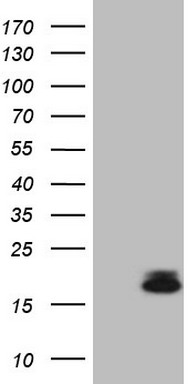Phospholipase A2 IIA (PLA2G2A) Mouse Monoclonal Antibody [Clone ID: OTI1C2]
CAT#: TA808040
PLA2G2A mouse monoclonal antibody, clone OTI1C2 (formerly 1C2)
Size: 30 ul
Formulation: Carrier Free
Specifications
| Product Data | |
| Clone Name | OTI1C2 |
| Applications | WB |
| Recommended Dilution | WB 1:2000 |
| Reactivities | Human |
| Host | Mouse |
| Isotype | IgG1 |
| Clonality | Monoclonal |
| Immunogen | Human recombinant protein fragment corresponding to amino acids 21-144 of human PLA2G2A(NP_000291) produced in E.coli. |
| Formulation | PBS (PH 7.3) containing 1% BSA, 50% glycerol and 0.02% sodium azide. |
| Concentration | 1 mg/ml |
| Purification | Purified from mouse ascites fluids or tissue culture supernatant by affinity chromatography (protein A/G) |
| Conjugation | Unconjugated |
| Storage | Store at -20°C as received. |
| Stability | Stable for 12 months from date of receipt. |
| Predicted Protein Size | 13.9 kDa |
| Gene Name | phospholipase A2 group IIA |
| Database Link | |
| Background | The protein encoded by this gene is a member of the phospholipase A2 family (PLA2). PLA2s constitute a diverse family of enzymes with respect to sequence, function, localization, and divalent cation requirements. This gene product belongs to group II, which contains secreted form of PLA2, an extracellular enzyme that has a low molecular mass and requires calcium ions for catalysis. It catalyzes the hydrolysis of the sn-2 fatty acid acyl ester bond of phosphoglycerides, releasing free fatty acids and lysophospholipids, and thought to participate in the regulation of the phospholipid metabolism in biomembranes. Several alternatively spliced transcript variants with different 5' UTRs have been found for this gene. [provided by RefSeq, Sep 2009] |
| Synonyms | MOM1; PLA2; PLA2B; PLA2L; PLA2S; PLAS1; sPLA2 |
| Reference Data | |
| Protein Families | Druggable Genome, Transmembrane |
| Protein Pathways | alpha-Linolenic acid metabolism, Arachidonic acid metabolism, Ether lipid metabolism, Fc epsilon RI signaling pathway, Glycerophospholipid metabolism, GnRH signaling pathway, Linoleic acid metabolism, Long-term depression, MAPK signaling pathway, Metabolic pathways, Vascular smooth muscle contraction, VEGF signaling pathway |
Documents
| Product Manuals |
| FAQs |
| SDS |
Resources
| Antibody Resources |
{0} Product Review(s)
Be the first one to submit a review






























































































































































































































































 Germany
Germany
 Japan
Japan
 United Kingdom
United Kingdom
 China
China




